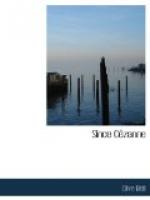That is my point. I do not presume to judge between one method of creation and another; I shall not judge between Matisse and Picasso; but I do say that, as a rule, it is the intellectual artist who becomes, in spite of himself, schoolmaster to the rest. And there is a reason for this. By expressing themselves intellectual artists appeal to us aesthetically; but, in addition, by making, or seeming to make, some statement about the nature of the artistic problem they set us thinking. We feel sure they have something to say about the very stuff of art which we, clumsily enough, can grasp intellectually. With purely aesthetic qualities the intellect can do nothing: but here, it seems, is something the brain can get hold of. Therefore we study them and they become our leaders; which does not make them our greatest artists. Matisse may yet be a better painter than Picasso.
Be that as it may, from Matisse there is little or nothing to be learned, since Matisse relies on his peculiar sensibility to bring him through. If you want to paint like him, feel what he feels, conduct it to the tips of your fingers, thence on to your canvas, and there you are. The counsel is not encouraging. These airy creatures try us too high. Indeed, it sometimes strikes me that even to appreciate them you must have a touch of their sensibility. A critic who is apt to be sensible was complaining the other day that Matisse had only one instrument in his orchestra. There are orchestras in which fifty instruments sound as one. Only it takes a musician to appreciate them. Also, one hears the others talking about “the pretty, tinkley stuff” of Mozart. Those who call the art of Matisse slight must either be insensitive or know little of it. Certainly Matisse is capable of recording, with an exquisite gesture and not much more, just the smell of something that looked as though it would be good to eat. These are notes. Notes are often slight—I make the critics a present of that. Also of this: it takes a more intense effort of the creative imagination to leave out what Tchehov leaves out of his short stories than to say what Meredith put into his long ones.
In the Plutarchian method there was ever a snare, and I have come near treading in it. The difference between Matisse and Picasso is not to be stated in those sharp antitheses that every journalist loves. Nothing could be more obtuse than to represent one as all feeling and the other all thought. The art of Picasso, as a matter of fact, is perhaps more personal even than that of Matisse, just because his sensibility is perhaps even more curious. Look at a Cubist picture by him amongst other Cubists. Here, if anywhere, amongst these abstractions you would have supposed that there was small room for idiosyncrasy. Yet at M. Leonce Rosenberg’s gallery no amateur fails to spot the Picassos. His choice of colours, the appropriateness of his most astonishing audacities, the disconcerting yet delightful perfection of his taste, the unlooked-for yet positive beauty of his harmonies make Picasso one of the most personal artists alive.




